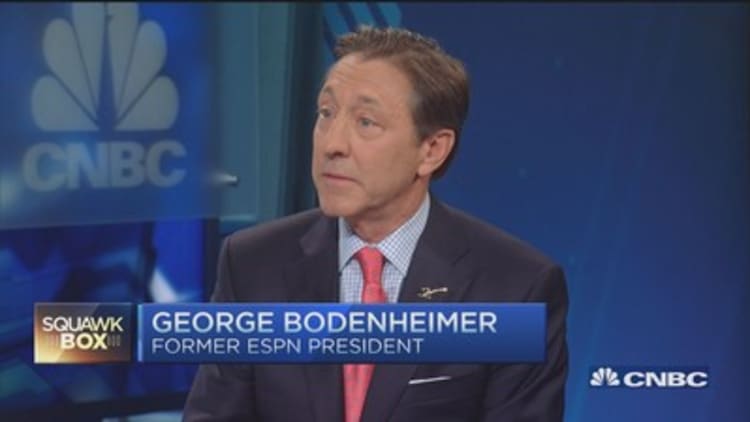
The war over breaking up the traditional cable and satellite television bundle has recently been personified by ESPN's breach of contract lawsuit against Verizon for the new slimmed down FiOS pay-for-only-the-channels-you-want service.
"The Verizon deal ... from arm's length looks like pretty straight forward. ESPN's position is Verizon does not have the right to do what they are doing," former ESPN President George Bodenheimer said Wednesday.
ESPN maintains the channel has to be included in the basic plan—an assertion that Verizon disputes.
Verizon's Custom TV service—starting at $55 per month—does not include ESPN in the base channel lineup. The plan has two free channel packs, which include two sports tiers among the options. Additional channel packs are $10 more per month.
Bodenheimer sees value in the traditional TV bundle model he helped create by persuading cable operators in the 1980s not only to carry a 24-hour sports channel, but to pay for it, too.
In a 33-year career there, he put Walt Disney-owned ESPN on the map—rising from the mail room to become the sports network's longest-serving leader.
"The bundle is here to stay for a long time for a great many number of customers," he told CNBC's "Squawk Box" in an interview. "[But] you can't stand in the way of technology. Consumers want more choice, and the Walt Disney Company and ESPN are working with our distributors and looking for new ways to distribute that product, as are all the cable networks."
For example, Dish Network, the satellite television giant, is offering its new Sling TV service, which offers a skinnier channel bundle delivered over the Internet. But unlike the Verizon plan, it has the blessing of ESPN and Disney, which along with ESPN2 and 20 other channels are offered in the base package for $20 per month. Additional channel groups cost $5 more per month, while HBO costs an extra $15 per month.
Besides its traditional television distribution model, Time Warner-owned HBO is offering online streaming subscriptions of the pay service to customers who don't have cable or satellite TV accounts.
Netflix, Amazon Video, and AppleTV have also been striking deals with content providers in an effort to serve the new breed of cord-cutting consumer.
Read MoreBig fight puts Periscope to the test
There's not going to be a one-size-fits-all model for watching television anymore, Bodenheimer predicted. "I think the mix is going to be a portion of the bundle and a portion of something else."
"And the something else is what we're going through as an industry," he added.


